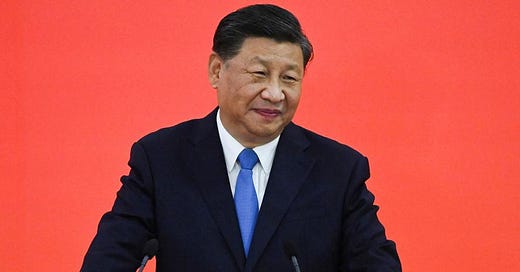Xi Jinping addressed the ongoing situation between Israel and Iran after nearly a week since the first strikes were launched. China has offered to mediate between Israel and Iran, but is not going to force or advocate for itself any central role in the process unless their is congruence between Israel and Iran on China playing that role. Until now, that seems highly unlikely.
The readout is below:
Astana, June 17 (Xinhua) -- Chinese President Xi Jinping met with Uzbek President Mirziyoyev during the Second China-Central Asia Summit in Astana on June 17 local time. The two heads of state exchanged views on the current situation in the Middle East.
Xi Jinping said that Israel's military action against Iran has caused a sudden escalation of tensions in the Middle East, and China is deeply concerned about this. We oppose any acts that infringe on the sovereignty, security and territorial integrity of other countries. Military conflict is not a way to solve problems, and the escalation of regional tensions is not in the common interests of the international community. All parties should promote the cooling of conflicts as soon as possible to avoid further escalation of tensions. China is willing to work with all parties to play a constructive role in restoring peace and stability in the Middle East.
Until now, it does not seem like there is a viable exit ramp. Even if either or both sides seek an exit, there is also the challenge of finding a mutual third space to mediate. China, Iran, and Russia share a number of multilateral platforms (Shanghai Cooperation Organization, Astana Process, BRICS) which could be used as a de-escalation platform, but Israel may be less inclinded, especially if they see a best deal coming through Washington. Iran is less inclinded to make a deal with Washington for the forseeable future, unless forced into it under duress. The EU could be an interesting platform, but reports of potential participation by European militaries in support of Israeli operations could complicate this. The obvious choice is returning to the Oman nuclear talks, but that ship may have sailed.
The reality is Iran has too few friends at the moment, and its traditional partners see little incentive to intervene on its behalf. Meanwhile, Israel’s leadership, despite ongoing international criticism over its war in Gaza, have been able to drum up some degree of support following its strikes last week. However, most states, especially those in the region, see no value in intervening for either side or dragging this conflict out any further due to the risks of it pulling the whole region into a conflict spiral. This requires any actors, like the US, seeking to intervene to do so with little to no regional support and potential restrictions on the use of regional bases and postures on foreign soil.
The impact of a prolonged conflict will be felt across the region. Much of the economic, infratructure, and interconnectivity projects across the region would be severely impacted. No security, no stabitity, no interconnectivity. Israel’s leadership are unlikely to mourn this loss, but the rest of the Arab world stands to lose as a result. Meanwhile, China is watching closely to assess whether the Straits of Hormuz would close—effectively cutting off its energy supplies.
Two major questions now hang over the crisis. First, will the United States directly join military operations against Iran in support of Israel? Former President Trump’s tweets appear to threaten U.S. involvement if Tehran refuses to return to negotiations, injecting further ambiguity into Washington’s stance. Second, will Israel escalate its campaign toward political decapitation—and ultimately, regime change? Powerful voices in the U.S. are calling for both restraint and overwhelming force, but a move to dismantle the Iranian regime would carry enormous risk. Such an act would likely plunge the region into chaos, creating a massive power vacuum in a country of over 90 million people. The shockwaves would not only destabilize the Middle East but also reverberate through global energy markets, with far-reaching implications for international security and economic stability.
I also recommend the following analyses from the following Substacks:
, , as well as ongoing updates from me here at .



